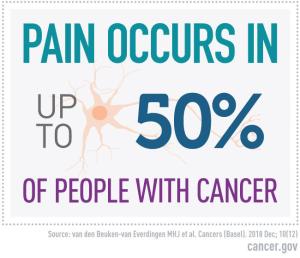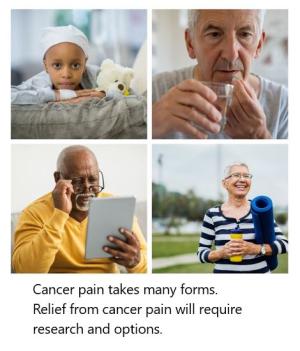Date Posted, by Rachel Altshuler, Ph.D., and Brennan Streck, Ph.D., R.N., M.P.H.
As improved cancer treatments have led to increased cancer survivorship, cancer survivors are now living longer with chronic pain. NCI is supporting research (search key word: pain) to address this issue.

Pain is one of the most common symptoms experienced by people who have cancer, and it can have many causes. Pain can come from cancer itself, from cancer treatment, or both, and it can be acute (short-term) or chronic (long-lasting). Pain can also pre-date a cancer diagnosis but be made worse by cancer or its treatment. In addition, pain from cancer treatment can result in reductions in the dose or length of treatment or treatment delays, which can lead to poorer outcomes.
Opioid analgesics are commonly prescribed for cancer-related pain. While these kinds of drugs may be appropriate for acute pain related to surgery, cancer progression, or end-of-life care, they aren’t always appropriate for chronic pain management or for treatment-related neuropathy (nerve damage due to chemotherapy that can result in painful symptoms), and alternative approaches are needed. Due to this need, researchers supported by the NCI Division of Cancer Prevention (DCP) are investigating opioid-sparing or non-opioid treatments and non-pharmacologic approaches to address cancer- and cancer-related pain.
In DCP, symptom science is a key research area that includes cancer pain. NCI has funded more than $50 million in pain and neuropathy research over the last 5 years. These include many cancer- and treatment-related pain studies and trials, both in the symptom management investigator-initiated grant portfolio and through the NCI Community Oncology Research Program (NCORP). Cancer-related pain areas of interest include oral and bone cancer pain, metastasis-related pain, post-surgical pain, aromatase inhibitor-induced arthralgia (joint pain), and chemotherapy-induced peripheral neuropathy.
Research on cancer pain is also funded by the NIH HEAL (Helping to End Addiction Long Term) Initiative, an NIH-wide effort to speed scientific solutions to stem the national opioid public health crisis. HEAL funding opportunities span preclinical, translational, and clinical spaces, and can cover research on the development of non-addictive analgesics, the discovery and validation of novel targets for safe and effective pain treatment, and the prevention, mitigation, and management of cancer pain as a symptom. (Find a searchable list of open HEAL funding opportunities here.)

In preclinical research, NCI is invested in the long-term goal of relief or prevention of pain related to cancer and its treatment through the discovery and development of therapeutic agents, devices, and procedures that may relieve pain. To meet this goal, researchers are trying to learn more about the pathophysiology of pain development and progression, and to develop better tools and models to study pain. A necessary question to address model development is to understand the interactions between cancer biology and cancer treatments in treatment-related pains. Researchers are looking at biomarkers of pain conditions, mechanisms of underlying pain conditions, and models of cancer- and treatment-related pain.
Clinical research on cancer pain supported by NCI includes clinical trials (keyword: pain) on pain therapies, devices, and delivery systems; identifying and predicting pain-related outcomes; associating pain with clinical endpoints; patient-reported outcomes; technology to facilitate pain reporting; health disparities in pain management; and mind-body interventions and psychological implications for cancer pain. Several clinical trials for pain and neuropathy are also conducted through the NCORP. Examples of studies include research into internet-based programs to help cancer survivors manage pain and treatments for reducing chemotherapy-induced peripheral neuropathy in people with certain types of cancer.
Learning more about pain from cancer and its treatment continues to be a vital part of DCP’s symptom science research. This year, DCP launched a Symptom Science webinar series aimed at fostering collaboration between researchers in this interdisciplinary field. Tune in to learn more about NCI-supported research on cancer symptoms including treatment-related neuropathy and many other symptoms affecting the lives of people with cancer.
If you would like to reproduce some or all of this content, see Reuse of NCI Information for guidance about copyright and permissions. Please credit the National Cancer Institute as the source and link directly to the blog post using the original title, for example: "Cancer Pain Research Addressing Multiple Causes, Multiple Managements was originally published by the National Cancer Institute." For questions, contact us at CancerPreventionBlog@mail.nih.gov.
